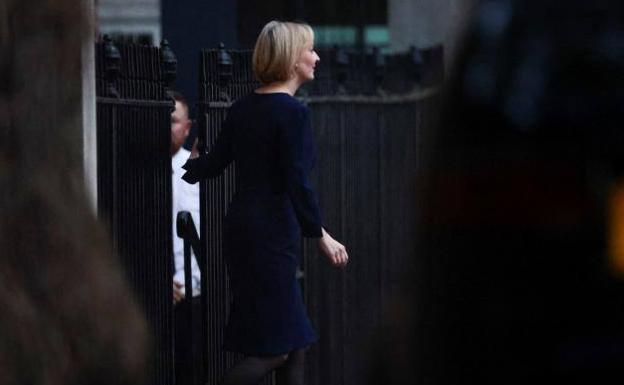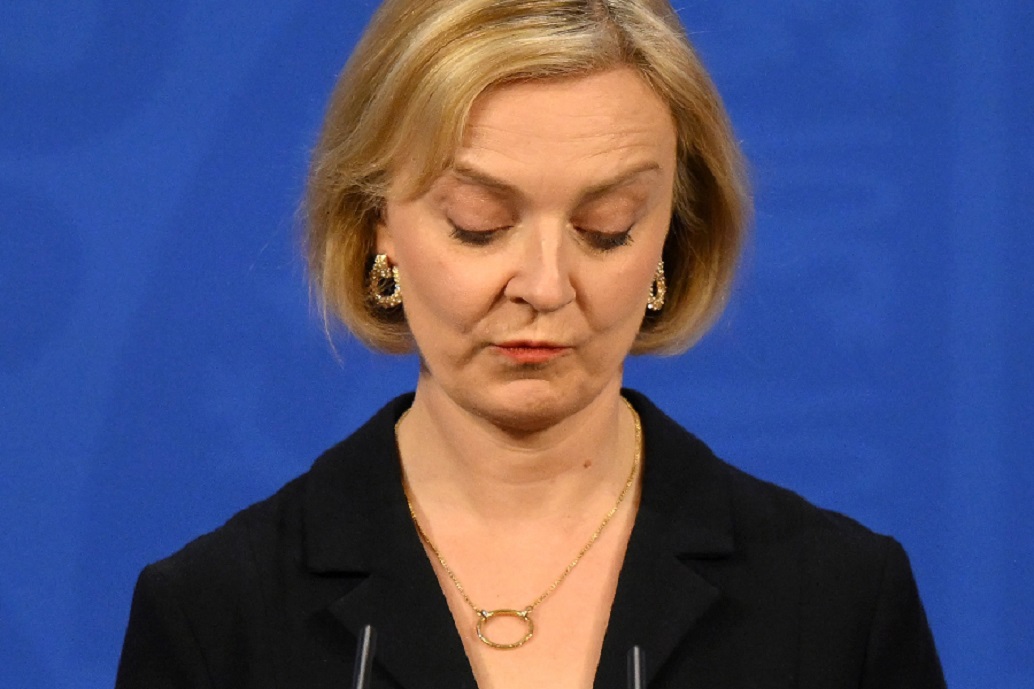Autor: Julio Santana – LIS Reino Unido
Con la dimisión de la primera ministra que asumió hace poco más de un mes, se sigue profundizando la crisis política, económica y social. El Partido Conservador y el Partido Laborista ensayan respuestas para salvar al régimen, en el marco de la alternancia bipartidista. Es necesario que irrumpa la movilización callejera y que los sindicatos convoquen a la huelga general, para que la crisis no recaiga sobre las espaldas del pueblo trabajador. La conformación de una nueva alternativa política de izquierda es una tarea inmediata, por un gobierno de los trabajadores y el socialismo.
Liz Truss asumió como primera ministra cuando cayó Boris Johnson, para intentar superar la crisis política y económica del Reino Unido. En ese momento planteó un plan neoliberal de corte ultraconservador que fue ampliamente repudiado y quedó desechado.
Vertiginoso camino hacia el abismo
La superestructura volvió a caer en el abismo, a tal punto que los analistas políticos venían señalando que no era Truss quien tomaba las decisiones sino Jeremy Hunt, el titular de Finanzas. La caída se precipitó cuando Truss se vio obligada a dimitir debido a que perdió el apoyo de su partido y la confianza de los mercados. Sin embargo, lo fundamental fue el rechazo popular a sus medidas, que se expresó en las encuestas y en la agenda de luchas en curso. Sus 44 días en el cargo constituyen el mandato más corto de la historia, motivo por el cual fue rebautizada como “La Breve”, en alusión al rey borbón Luis I, quien permaneció en el trono español por 229 días lo cual le valió el apodo “El Breve”.
No les funcionaron los fusibles
Luego del fracaso del plan de Truss fue despedido el canciller Kwasi Kwarteng, a quien le siguió la ministra de Interior Suella Braverman. Aunque Truss logró sobrevivir a la sesión de control parlamentario del miércoles 19, ya estaba en terapia intensiva con diagnóstico reservado. Por la mañana del jueves 20 convocó a una reunión en Downing Street y a las 13.30 horas anunció su dimisión. Es evidente que tampoco trajo estabilidad la asunción de Carlos III en reemplazo de su madre Isabel II. Los fusibles conservadores y de la realeza no funcionaron debido a que el Reino Unido atraviesa una crisis profunda y vertiginosa, en sincronía con la crisis sistémica del capitalismo a nivel global.
¿Quién sustituirá a Truss?
El cadáver político de Truss permanecerá en su cargo-morgue durante una semana, hasta que se elija un reemplazante. Hay varios nombres para el casting del horror: Rishi Sunak, Jeremy Hunt, Ben Wallace, Penny Mordaunt y, hasta el propio Boris Johnson. Los Tory tomaron la decisión de repetir el mecanismo de selección de Liz Truss: elegir al nuevo primer ministro entre las cuatro paredes del cuartel general del Partido Conservador sin ninguna consulta democrática al pueblo.
El Partido Laborista sale a salvar al régimen
El líder del Partido Laborista, Sir Keir Starmer, planteó la necesidad de convocar a elecciones anticipadas para aprovechar la simpatía electoral que adquirieron durante la crisis. Ni siquiera le pasa por la cabeza llamar a que irrumpa la movilización callejera. Como una de las dos patas del bipartidismo, pretenden canalizar la crisis dentro de los márgenes del régimen y el sistema capitalista. Los acontecimientos configuran dos crisis que se combinan y retroalimentan.
El gobierno, el régimen y el sistema a los tumbos
Una de las crisis en desarrollo es la del gobierno y el régimen. Los conservadores dejaron de apoyar a quien habían ungido en septiembre. Y, en el colmo del delirio y la falta de respeto al pueblo, plantean el regreso de Boris Johnson como una posibilidad en danza. Que se baraje el retorno de semejante personaje luego de su fracaso, muestra la descomposición imperante. La otra crisis es sistémica. Como ya planteamos en un artículo anterior, la crisis económica es tan profunda que provocó la caída de la libra a niveles históricos, más aumentos de precios en los alimentos de primera necesidad, de la energía, los alquileres y las hipotecas. La crisis no es superficial, ni esporádica, sino profunda y sostenida, como expresión de la crisis capitalista mundial en curso.

Hace falta una huelga general
Lamentablemente, los dirigentes sindicales tampoco están respondiendo a la altura de las circunstancias. Están dejando que las batallas contra el gobierno se libren sindicato por sindicato y no impulsan que la clase trabajadora sea protagonista ante la crisis política. Han mencionado la necesidad de coordinar las huelgas, pero no la concretan con lo cual, hasta el momento, ha sido solo una postura hacia la prensa. ¿Por qué el TUC (Trades Union Congress) no convoca a la huelga general? ¿Por qué los dirigentes de los sindicatos en lucha no reclaman la huelga general? La respuesta es simple: están actuando como correa de transmisión de la política del laborismo para contener al movimiento obrero. En momentos en que el gobierno experimenta una debilidad absoluta, ponen hielo en la inflamación que causa la aparición del movimiento obrero en los primeros planos de la escena. Todo para allanar el camino del Partido Laborista que ya advierte sobre sus limitaciones al plantear que dependerán de “la herencia recibida”. No sería una sorpresa sí en el futuro fueran estos dirigentes los encargados de pedir paciencia para frenar las luchas y facilitar un gobierno laborista.
Un programa para que la crisis la paguen los capitalistas
Es el momento para que la movilización obrera imponga una agenda de lucha y reivindicaciones propias, con propuestas transicionales. ¿Cómo se puede avanzar en superar los graves problemas sociales del pueblo trabajador sin echar mano sobre las arcas de los capitalistas, que siguen amasando inmensas (y obscenas) ganancias? ¿Cómo se va a revertir el aumento de las facturas de energía, sin nacionalizar las empresas y ponerlas bajo control de sus trabajadores y usuarios? ¿Cómo se van a conseguir pensiones dignas sin nacionalizar todo el sistema? ¿Cómo se puede lograr que la inflación no vacíe los bolsillos de los trabajadores sin cláusulas de reajuste automático del salario con acuerdo a los aumentos de precios? Hace falta un plan económico de emergencia para que la crisis la paguen los capitalistas. Ni un primer ministro conservador ni uno laborista irán en esta dirección, por el contrario, favorecerán los intereses de los poderosos, los ricos y privilegiados del Reino Unido. Lo que hace falta es un gobierno de los trabajadores y el pueblo con un sistema socialista.
Es necesario conformar una nueva alternativa política de izquierda
En el laborismo hace tiempo que hay sectores que plantean la posibilidad de conformar un nuevo movimiento político alrededor de la figura de Jeremy Corbyn. Lo cierto es que cuando Corbyn fue líder de la oposición se desdibujó en los márgenes del reformismo. Lo mejor sería construir un nuevo movimiento, de izquierda, con candidatos obreros en la primera línea. Las grandes movilizaciones y huelgas en Francia marcan el camino a seguir y al mismo tiempo reafirman las enormes limitaciones del reformismo al que es necesario superar. La conformación de una nueva herramienta de izquierda anticapitalista es una tarea presente e indispensable, para enfrentar la alternancia bipartidista en el poder con propuestas inmediatas y estratégicas.




